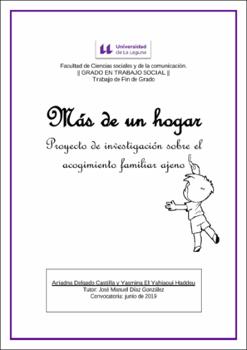Más de un hogar: Proyecto de investigación sobre el acogimiento familiar ajeno.
Fecha
2019Resumen
A través del siguiente trabajo de investigación, se presentan los resultados de una investigacióncuantitativa observacionaly descriptiva realizada sobre dos grupos de población con características distintas. El primero, cuenta con la experiencia previa del acogimiento familiar ajeno, mientras que el segundo no ha vivido dicha situación con anterioridad. El fin de estainvestigación se basa en analizar las motivaciones principales, así como el nivel de conocimiento general que tiene la población sobre el acogimiento en familia ajena.Para la recogida de los datos se ha empleado un cuestionario ad hoc con preguntas orientadas en función de los objetivos planteados y las hipótesis.El estudio muestra que existe un desconocimiento generalizado de la población sobre este recurso ya que no son conocedores de las nociones básicas del mismo. En cuanto alasfamilias acogentes, son escasas y es posible que ello se deba a la insuficiente difusión que existe sobre esta medida. No obstante, destaca la percepción general positiva de la experiencia, hecho que repercute en la reincidencia de la práctica. Por el contrario, los elementos desmotivacionales que inciden en la toma de decisión al plantearse volver a ser familia de acogida, son en gran medida el afán de autoprotección y la mala organización del servicio. Through the following research work, we present the results of an observational quantitative research of a descriptive and cross-sectional typeconducted on two population groups with different characteristics.First has previous experience of fostering another family, while the second has not experienced this situation before.The purpose of this investigation is based to analyze the main motivations, as well as the level of general knowledge that the population has about fostering in another's family.For the collection of data, was used an ad hoc questionnaire with questions oriented according to the objectives and hypothesis. The study showsthe general ignorance that the population has about this resource, although, even knowing the theoretical concept of fostering in another's family, they do not handle the basic notions of it.Referring to the welcoming families, they are few in numbersbecause of the scarce diffusion that exists on this measure.However, the positive perception after the experience, a fact that has repercussions in the recidivism of the practice.On the other hand, it is relevant the demotivational elements that affect decision-making when considering returning to be a host family, are to a large extent the desire for self-protection and the bad organization of the service.





